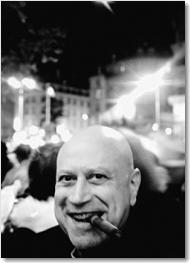Excellent post by fellow Belgian Borsky and ‘pataphysician on his book shopping trip to Paris. He got to visit Un Regard Moderne, which was closed last time I was there.
I found the bookstore ‘Mona Lisait’ (Mona did read) at rue Danton #6. All old unraid books from stocks. I discovered a real treasure in the basement: two numbers of ‘Bizarre’ in minted condition. Some people would commit a murder for those, published by one of two revolutionary editors in the french language: Jean-Jacques Pauvert (the other one is Swiss Eric Losfeld). This legendary magazine from the fifties was the soil from which many pataphysicians realized their life purpose. Surrealism, dadaism and a thick layer of serious humor, with special issues about strange literature, naive art, literature studies etc. made Bizarre [1], [2] a holy grail to me. I only owned one copy for which I had paid a lot ten years ago. Now I tripled my collection for just a few euros (the poor librarian had no idea what she sold me).
Apparently Bizarre magazine was started by Losfeld and then taken over by Pauvert in 1955. From the French Wikipedia: “Il reprendra à son compte en 1955 la revue Bizarre crée par Éric Losfeld. ”
Losfeld had only edited two issues when Pauvert took over:
Revue BIZARRE N° 02- ( Seconde série )- Thomas Owen, Jean Ray, Jean Mayoux, Michel Carrouges, Jean-Hugues Sainmont, Camille Renault, Jacques B. Brunius, Paul Gibson, Jacques Yonnet, Michel Morphy, René de Obaldia, Philippe Soupault, Nick Carter, Claude Ernoult, R. Chomet, G. Klein, Mayo, Agnese, Henri Bouché, Michel Bonno, Guy Jumeau Revue BIZARRE N° 02- ( Seconde série )- Ed. J.J. Pauvert, Octobre 1955. In 4°, br, 95 pp.+ 6 feuillets gris-vert, Rédacteur en chef : Michel Laclos- Au sommaire : Thomas Owen, Jean Ray, L’ insaisissable- Jean Mayoux, Les machines célibataires de Michel Carrouges ( Fin )- Jean-Hugues Sainmont, Camille Renault, créateur du monde ( Photographies )- Jacques B. Brunius et Paul Gibson, Un peu moins de bruit- Jacques Yonnet, Univers virgule cinq- Michel Morphy, Canaille en soutane- René de Obaldia, L’ Heure qu’ il est- Philippe Soupault, Mort de Nick Carter- Claude Ernoult, Science-Fiction et réthorique des idées- R. Chomet et G. Klein, Bestiaire ” Digest ” de la S.F.- Illustrations de Mayo, Agnese, Henri Bouché, Michel Bonno, Guy Jumeau, J.-H. Sainmont- Annonce page 53: Bizarre publiera dans ses prochains numéros J.-L. Borges- ( Note personnelle: ?- )- Très bon état- Une première série a paru auparavant, édité par Losfeld, avec seulement 2 numéros : Gaston Leroux N° I – Granville N° II- La seconde série est éditée par J.J.Pauvert (46 numéros )- —source
More on the dis/similarities between Pauvert and Losfeld:
Eric Losfeld, the original publisher of the work translated here (THE NUN (Count D’Irancy)) for the first time, was a horse of a different colour altogether. It’s difficult to say whether Losfeld and Pauvert were rivals exactly, since despite their beginnings in clandestine publishing, their approach to it was quite dissimilar. Sarane Alexandrian,who does see the pair as rivals, summed up the differences rather well: “Jean-Jacques Pauvert. a eu une carriere bien differente, mais non moins interresante. Losfeld fut un surrealist editeur, Pauvert un editeur du surrealism; voila ce qui les distingue.”
Losfeld gives a good indication of his surrealist approach to life early in his memoirs. When on his military service in the 1930’s, he writes to Adolf Hitler:
“Monsieur, Je suis un soldat belge qui s’ennuie dans une ville de garnison qui s’appelle Namur . Je vous en rends personnallement responsible. En consequence, j’ai l’honneur de vous declarer la guerre.”
There is no record of what reply, if any, was received from Berlin . —Patrick J. Kearney via here.
To conclude, some additional info on Pauvert’s publishing and extra Bizarre covers here.
Il me semble avoir une dette personnelle à l’égard de Jean-Jacques Pauvert, comme tous ceux à qui ses livres apportèrent autant de bouffées d’air frais dans un monde trop policé. Le temps où l’on ne pouvait lire Sade, Pauline Réage ou Bataille semble bien éloigné. Mais je ne peux m’empêcher d’avoir une affection particulière pour certains livres de ma bibliothèque où son nom apparaît : Hollywood Babylone de Kenneth Anger, la revue Bizarre, la première monographie de Clovis Trouille, et beaucoup de titres de la « Bibliothèque Internationale d’Erotologie » qui n’ont pas tout à fait perdu leur goût sulfureux : Les « enfers », Le vampire, Métaphysique du strip-tease, Mythologie du sein, Eros du dimanche…
Borsky also informs us that Robert Anton Wilson has died.









